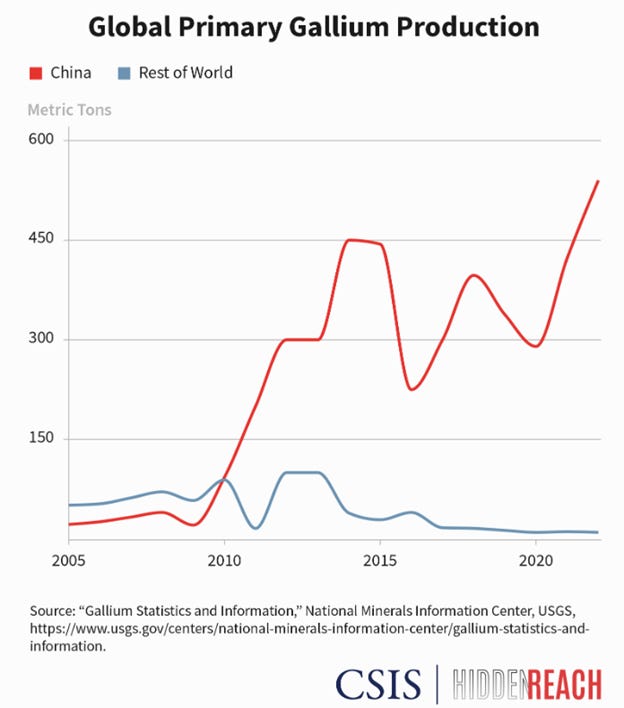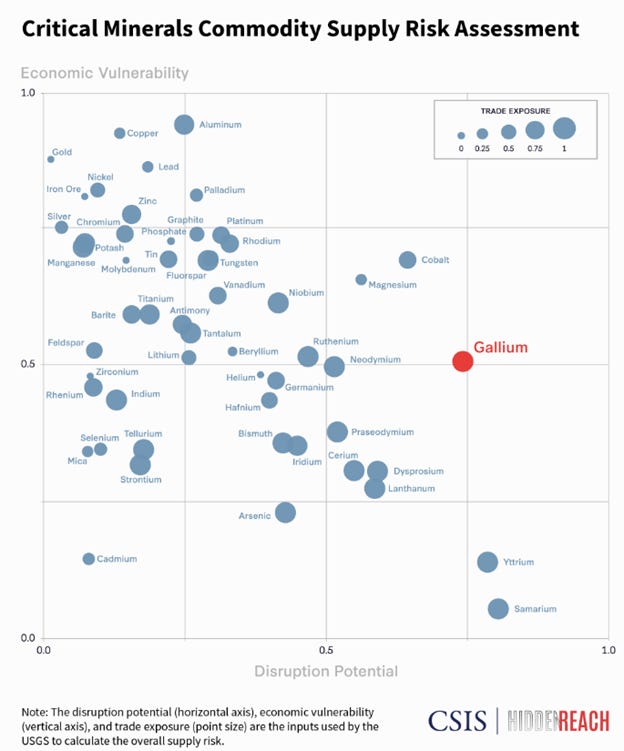Bullets:
In retaliation over semiconductor export bans, China banned exports of gallium. A mere 30% reduction in gallium supplies to global markets would result in a $602 billion hit to the US economy alone, according to experts.
What's more, gallium is a critical component in 5G telecom gear, a market where Huawei already has large advantages and is believed to be at least a generation ahead of competitors outside China.
Gallium nitride allows for telecom gear to be made much lighter, resulting in far lower costs for installation, maintenance, and repair, and allows for lighter masts and poles.
For Huawei's rivals in the 5G space, such as Nokia and Ericsson, a gallium ban would put them even farther behind Huawei.
China controls over 95% of the global market for gallium, and the White House's own official analyses of China's gallium monopoly concluded that an export ban would result in crippling effects to a wide variety of US industries, including defense.
Report:
A supply chain starts with raw materials at the top, and on all the way down, finally down to the end buyer. And it’s a fact of life on this earth, that the real power is at the top, not at the bottom. Wars are fought over the top of the supply chains. Ask any kid who plays a war strategy game on his computer, or goes to a world history class, and he’ll be quick to remind us: Wars are not fought over bakeries. But wars will be fought over the best farmland. Two countries at war might try to bomb each other’s oil refineries, and put several aircraft crews at risk. But they will send entire armies overland, in order to take an oil field away. Because without the oil, the refineries don’t matter.
How many wars, throughout history, have been waged over water, or fishing grounds? Nobody cars about the companies that make fishing nets or poles—if you’ve got the fish, you’ll figure out better ways to catch fish. The real wealth, the real power, is at the top of the supply chain.
And China is at the top, of most of them. When we hear experts talk derisively about the BRICS countries, Brazil, Russia, India, China, and all their new friends in South America and Africa—these are the world’s natural resources economies. And it simply means that we’ve forgotten where things really come from. We think gasoline comes from a pump at the gas station, and that computers come from a store, because that’s how removed we are now, from factories, and refineries, and mines.
This goes a long way, to explain why sanctions fail; why the sanctions against Russia have failed, and why the Chip Wars against China have failed. These are export curbs and restrictions we put on our companies that sell the most advanced semiconductor chips to Chinese companies, like Huawei. There are several reasons that the chip war is lost, and we pay lots of attention to two of those big reasons. First, China has millions of very smart people who were put to work right away to build these chips themselves. The second problem is that China itself is a giant consumer and user of these advanced chips, and our own companies are strongly motivated to keep selling their chips to China if they want to stay in business. But another problem is that these chip bans involve moving up the supply chain, instead of down. Before our companies can even make advanced electronics, first they need the raw materials to build them, and China and the other BRICS countries own those raw materials.
Until last year, almost nobody had heard of gallium. But the people who knew what gallium was, and how important it is, they knew that we had a big problem with gallium. China retaliated against the semiconductor trade restrictions by banning the sale of gallium, which is used to make gallium nitride. And gallium nitride is critical in telecommunications.
Most of the world’s gallium is in China. Our top officials knew how important gallium is, in the manufacturing of the very semiconductors themselves. Gallium nitride has huge advantages in RF amplifiers, which means that access to gallium is vitally important to manufacturers of 5G equipment. This is one of Huawei’s markets, and Huawei is the target of many of our semiconductor bans.
The chip bans did temporarily set back Huawei in acquiring the most advanced chips, but the fact that China has most of the world’s gallium means that Huawei will always have enormous advantages in telecom, especially if China just decides to keep it all for themselves.
But it’s not just that. This article goes into the science and chemistry of the gallium, and not only is gallium nitride so important in telecommunications, American companies can’t seem to figure out how Huawei got gallium nitride to work so well. Huawei’s 5G equipment are much lighter than comparable products from Ericsson and Nokia, which gives Huawei even more advantages. Heavier equipment needs more systems to keep them cool, it means that the masts—the poles—need to be able to support the heavier systems, and need more workers and heavier equipment are required to to install those and maintain them, and that drives up the cost even further.
The United States has insisted for years that Huawei equipment be ripped out and replaced with non-Chinese-built gear, but nobody wants to really do that, because of all these problems. In fact, even the Pentagon asks for a waiver every year, so they don’t have to comply with our own laws to replace Huawei equipment in our most critical communications systems. Huawei is now a generation ahead of any of its rivals in 5G, and in telecom. Huawei can get gallium, and they know what to do with it, and our companies can’t, and don’t.
Here are our own official reports and top think tanks, weighing in. The White House and top Washington officials have known about this vulnerability in our own supply chains. If China is effective in banning the export of gallium it would be very damaging to our own companies. This report from mid-2021 is a 250-page White House assessment of the supply chain issues facing the United States in the most critical materials, and gallium is mentioned 14 times. Gallium nitride is important in power management and distribution, and semiconductors. Later the report mentions gallium’s importance in 5G, autonomous vehicles, renewable energy, and defense systems. Later that gallium necessary for wafers are concentrated in China, and the problems for several key industries because of their dependence on China for the gallium.
This report is from European supply chain analysts for metals, and they put China’s gallium production over 95%, and note that Huawei has over 2,000 patents for gallium.
“The worldwide supply of gallium is under Chinese control”.
The CSIS estimates of China’s gallium supply are even higher, at 98% for raw gallium. China’s advantages in gallium are derivative of their advantages in aluminum production, which is where most of the gallium tends to be. Here’s a chart for global aluminum production that looks like a thousand others, China starts at zero twenty years ago and they draw a vertical line and everyone else just stands still:
Ugly as that chart is for aluminum, the one for gallium is worse. This isn’t gallium compared to the United States, this is China versus the whole world:
On a supply chain risk assessment for the United States, the gallium supply scores very high in Disruption Potential, which is the X axis, and on Economic Vulnerability, the vertical:
CSIS dug in, crunched the numbers, and concluded that a 30% supply disruption in gallium would result in a $602 billion dollar economic hit to the US economy. The effects would cascade through industrial production, including for production of key weapons and military systems:
That’s just 30% gallium supply disruption. So--This assessment was from last August, 2023. The White House report was from 2021. Both of them reached the same conclusions, that China’s advantages in all these key materials that are so vital in electronics, and in semiconductors, in clean energy, are basically insurmountable.
Yet our governments went ahead anyway, and banned the exports of some advanced chips and equipment up the supply chain. Did our own officials think that Chinese industry leaders were unaware of their monopoly in gallium, and would keep selling it anyway? Or did they assume that nobody in China could do perform a Google search for “gallium supply chain” and not find these unclassified reports on page one of the results?
In any event, China retaliated by banning the exports of rare earth metals DOWN supply chains. Washington and the EU said to China, won’t sell you any more bread. China said no problem, they won’t sell us any more flour. They’ll bake their own bread.
Resources and links:
Huawei has one 5G power that is hard for the US to hurt
https://www.lightreading.com/5g/huawei-has-one-5g-power-that-is-hard-for-the-us-to-hurt
China bans exports of key microchip elements to US as trade tensions escalate
https://www.theguardian.com/world/2024/dec/04/us-china-microchips-export-bans-gallium-germanium
BUILDING RESILIENT SUPPLY CHAINS, REVITALIZING AMERICAN MANUFACTURING, AND FOSTERING BROAD-BASED GROWTH
https://www.whitehouse.gov/wp-content/uploads/2021/06/100-day-supply-chain-review-report.pdf
Gallium: China is increasing its influence on the miracle metal as Huawei is working on promising applications beyond 5G
De-risking Gallium Supply Chains: The National Security Case for Eroding China’s Critical Mineral Dominance
Even the Pentagon can’t completely freeze Huawei out of its operations
https://fortune.com/asia/2024/07/03/pentagon-huawei-ban-national-defense-authorization-act/
Pentagon says it's impossible to ditch Huawei telecom gear — officials beg Congress for waiver from Chinese sanctions
The Pentagon and FCC have a big Huawei problem: there are no substitutes, and there's no more money
Petroleum supply chain diagram
https://www.researchgate.net/figure/Petroleum-supply-chain-WKP-2015_fig2_320629231
Visual Capitalist, Visualizing the BRICS expansion in 4 charts
https://www.visualcapitalist.com/visualizing-the-brics-expansion-in-4-charts/
Chinese companies are going around US semiconductor export bans. So are American companies.








Excellent steady/reliable Facts!
Well America it's the old story: As ye sow so ye shall reap